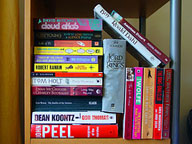2.1.- Quantifiers (I).

Do you know the difference between few, a few, little, many or much? We are going to study some determiners or quantifiers now.
The most common English quantifiers are:
- Much, many.
- A lot of, lots of, plenty of.
- Little, few, a little, a few.
- Some, any, no, none (of).
- All, every, the whole, enough, several.
Some pronouns which are derived from the determiners above are:
- Something, somebody / someone, somewhere.
- Anything, anybody / anyone, anywhere.
- Nothing, nobody / no one, nowhere.
- Everything everyone / everybody everywhere.
Let's take a look at some of these quantifiers in more detail.
- Lots of, a lot of, plenty of: They are used with countable or uncountable nouns and are normally used in affirmative sentences. They mean: muchos / muchas in the plural or mucho / mucha in the singular form.
- A lot of / Lots of students / books / ideas.
- A lot of / Plenty of / lots of sugar / water / information.
- She has got a lot of brothers. There are plenty of students here.
- Many is used with countable nouns and Much is used with uncountable nouns. They are normally used in questions or negative sentences. Many: muchos / muchas. Much: mucho / mucha.
- She hasn't got many problems / children. There aren't many students here.
- We haven't got much information / water / time / money.
- Little and few imply negative ideas. Little means not much, poco / poca and it is used with uncountable nouns. Few means not many, pocos / pocas and it is used with countable nouns.
- There is little time, hurry up! She is quite poor, she has got little money.
- There are few people in the street because it is really cold now.
- A little and a few are more positive ideas. A little means some, un poco / una poca and it is used with uncountable nouns. A few also means some, unos pocos / unas pocas and it is used with countable nouns.
- Don't worry, we have a little time. (This means they have some time.)
- I have got a few friends in Seville to visit next weekend. (This means I have some friends.)
Ejercicio Resuelto
Click to read the spanish translation.